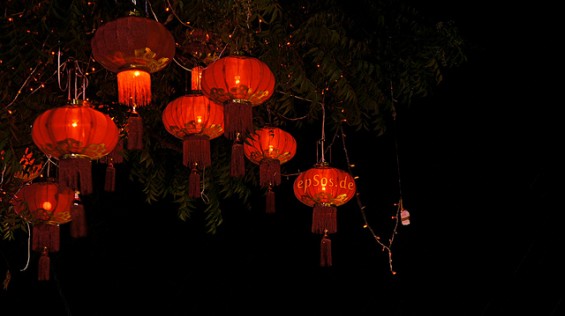“I like it when you explain what I’m seeing.”
I had sent a video clip to a colleague—of a performance artist interacting with a warehoused sculpture, a giant suspension if you will, of metallic cones, that could both touch and not touch the floor (touch it with their shadows, but never touch it with their tips, as they hung from the ceiling). My colleague had responded to the clip by telling me she particularly liked segment 1:40-1:49. I had liked those parts too—the artist’s back up against the wall, the almost involuntary climb, and the persistent reach-kick towards a single motionless cone to initiate the slightest movement: it mesmerized. Almost as much as the ensuing bit, in which the performer, surrounded by more suspended cones, kneeled and focused his energies quietly, steadily, on one patch of floor, pressing his hopes into it like a longing god shaping dreams, his very breath now creating something imagined where only a moment ago nothing seemed to exist.
This is what I told my colleague: maybe we liked these parts of the video for their persistence, their hope, and the way, surprisingly, a performance artist interacting with suspended cones and the floor over which they dangled and shadowed, could tell us about ourselves and our work to “create the world that ought to be” through poetry.
It has been my peculiar experience as a poet to explain to people what they are seeing, albeit through what can feel like an added layer of obscurity. Take this poem, for instance, also based on recorded motion and the interplay of actors with what is a kind of sculpture. (If you have seen the film Hero, you understand that the huge swaths of fabric which appear throughout—now suspended, now draped, now falling—are sculptures that the actors perform with, to explain to you what you have seen somewhere and did not know how to express.) In any case, the poem:
Watching Hero
The sheet was red
and silken.
It lay between us,
and the man
and the woman
he took to bed.
Some things,
says Young,
must be made
opaque
to be seen.
I am still
satisfied
that I showed
the screen
to my children;
hidden elbows, knees,
pointing the way
to intimate
distress.
Upon reading such a poem, you might feel you have both more and less of an explanation for something you yourself have experienced—maybe on a subway somewhere, or at Yellowstone Park, or around a holiday table when you felt you were looking at the day as if through glass. You were, as it went, both inside and outside the experience. You were enlightened and confused, both.
This is one function, perhaps, of great art and the work of people like me who seem, at first blush, to explain it. From one hand something is given, while the other hand takes something away, causing you to reach, to ask, to climb the wall (your back against it) and initiate the slightest movement, or send you to the floor to press your hopes into it, to form, if you could, something, where only moments before nothing seemed to exist.
Photo by EpSos.de, Creative Commons license via Flickr. Post by L.L. Barkat, author of The Novelist: A Novella. Post originally appeared at the Curator; reprinted with permission.
________________
Buy a year of Every Day Poems, just $5.99 — Read a poem a day, become a better poet. In January we’re exploring the theme Coffee and Tea.
- Found in Translation: Gently May It Sing - September 15, 2025
- Learning by Poetry: Vous venez d’où? - September 1, 2025
- 5 Fun Ways to Play with Language! - August 18, 2025


Claire says
I felt a sense of that enlightenment and confusion reading this which I guess means it has achieved its purpose: for it is art.
Elizabeth Wynne Marshall says
“…an added layer of obscurity.” This give me insight into poetry which I have been unable to put into words. It is both what draws me to it and perhaps what keeps others away. I love peeling back the obscure and walking into the discover, as Alice in well, you know…..Wonderland. The act of discovering the art, the poem, beautiful.
“…causing you to reach, to ask, to climb the wall, to initiate the slightest movement…” yes the interaction between reader, poem and poet.
Love this..all of it. (Now I must see the movie)
L.L. Barkat says
‘Hero’ is art in every sense of the word. Story, sound, images all come together in a stunning way.
Come back after you watch and tell us what you thought? 🙂
I think that great art can be intimidating, yes. But it should be compelling enough that it tempts people to have courage and step in. Such a challenge for the artist!
L.L. Barkat says
That makes me smile, Claire.
I’m guessing that great art does more than enlighten and confuse. What else, in your opinion?
Also, I wonder if art does only one or the other… if it has not quite reached its potential. 🙂